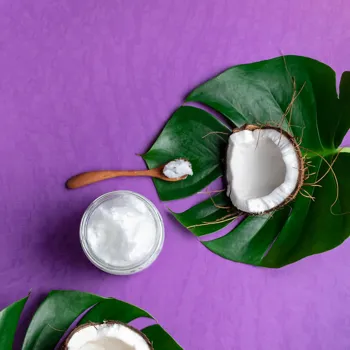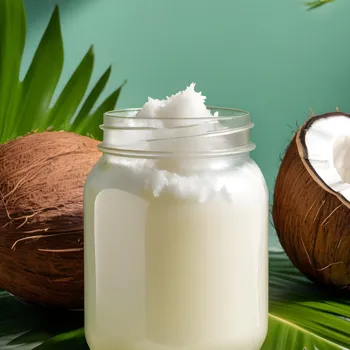Unveiling the Coconut Oil Controversy: Myth or Miracle? Dive into the debate to separate facts from fiction!
Coconut oil, a kitchen staple in many Indian households, has enjoyed a rollercoaster ride in the
health world. Once demonized for its high saturated fat content, it was later hailed as a superfood with numerous benefits. However, the debate about its healthfulness continues to simmer.

So, what's the real story? Let's delve into the controversy surrounding coconut oil and separate fact from fiction.
Coconut oil: versatile but controversial due to high saturated fats
Many swear by coconut oil for everything ranging from cooking and baking to skincare and hair care. Its distinct flavour makes it a favourite for South Indian dishes, and some believe it aids in weight loss, boosts immunity, and even improves brain function. But not everyone is on board.

Health organisations often advise caution due to its high saturated fat levels, raising concerns about heart health. This creates a lot of confusion for the average consumer simply trying to make informed choices.
The key lies in understanding the different types of fats, how they affect our bodies, and the context in which coconut oil is consumed in our daily lives like cooking or applying on hair and skin.
Controversy surrounds coconut oil's high saturated fat content and its impact on heart health
The main reason for the controversy is coconut oil’s high saturated fat content. Saturated fats have been linked to increased levels of LDL cholesterol, often called "bad" cholesterol, which can contribute to heart disease.

The American Heart Association, for example, advises limiting saturated fat intake. But not all saturated fats are created equal. Coconut oil is rich in medium-chain triglycerides (MCTs), which are metabolised differently than long-chain triglycerides found in animal fats.
Some studies suggest that MCTs may be more readily used for energy, potentially leading to some health benefits. However, the scientific community hasn't reached a consensus on the overall impact of coconut oil on cardiovascular health, and more research is needed to clarify the long-term effects.
Considering this is a daily item for many, deep exploration of the pros and cons is important.
Coconut oil has antimicrobial, skin benefits, but more human trials needed for confirmation
While its effect on cholesterol levels is debated, coconut oil possesses other properties that might be beneficial. It contains lauric acid, which has antimicrobial properties, which helps to fight bacteria.

Some studies have shown that coconut oil can improve skin hydration and reduce symptoms of eczema. In Ayurveda, it is used to heal wounds. Coconut oil may also possess antioxidant properties, further contributing to overall health.
However, it’s important to note that many of these studies are small or conducted in vitro (in test tubes), and more robust human trials are necessary to confirm these benefits.
While some prefer coconut oil some prefer other oils and this is purely based on individual preferences in food and skincare. But the benefits cannot be denied and it is still a very potent oil for consumption or for other usage.
Moderation key for incorporating coconut oil into diet
So, how should you incorporate coconut oil into your diet? Moderation is key. If you enjoy the flavour of coconut oil, use it sparingly as part of a balanced diet. Don't replace other healthy fats like olive oil or avocado oil with coconut oil.

Consider using it in specific recipes where its flavour profile complements the dish. Keep in mind that it's a calorie-dense food, so portion control is important. A balanced diet rich in fruits, vegetables, whole grains, lean protein, and healthy fats remains the cornerstone of good health.
One should not just blindly pick up any oil because it is very popular, one should always see what benefits it has on the user and then accordingly consume the oil in moderation.
Personal decision to use coconut oil based on health factors; consult professionals
Ultimately, whether to use coconut oil or not is a personal decision. Consider your individual health factors, including your cholesterol levels and heart disease risk. Consult with your doctor or a registered dietitian for personalized advice.

They can help you assess your overall diet and determine if coconut oil fits into a healthy eating plan for you. Remember, there's no single "superfood" that guarantees perfect health.
A holistic approach to nutrition, prioritizing a variety of whole foods and a balanced lifestyle, is the best way to achieve long-term well-being. While coconut oil definitely has some use cases, one also needs to understand the benefits for them before consuming any food products.
AI Generated Content. Glance/InMobi shall have no liability for the content










